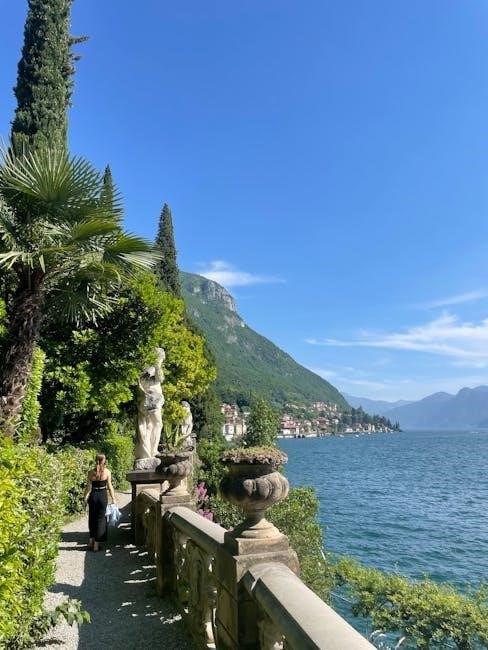
Josef Pieper’s seminal work, Leisure, the Basis of Culture, explores the profound relationship between leisure and culture, asserting that leisure is essential for fostering meaningful human existence and cultural development.
1.1 Overview of Josef Pieper’s Philosophy
Josef Pieper, a 20th-century German philosopher, emphasizes the centrality of leisure in fostering intellectual and spiritual growth. His philosophy, rooted in Greek and medieval thought, critiques modern society’s overemphasis on work, advocating for a balance that allows leisure to nurture cultural and spiritual life. Pieper’s ideas remain timeless, offering insights into the essence of human existence and the pursuit of meaning.
1.2 The Significance of Leisure in Modern Society
Leisure is vital in modern society as it counteracts the dominance of work and consumerism. Pieper argues that true leisure, characterized by reflection and celebration, is essential for cultural preservation and spiritual renewal. In today’s fast-paced world, reclaiming leisure is crucial for fostering creativity, intellectual growth, and a deeper connection to life’s meaning, ensuring a balanced and fulfilling human experience.
The Historical Context of Pieper’s Work
Written in 1948, Pieper’s work emerged in the post-war era, emphasizing leisure’s role in cultural renewal amidst rising workaholic tendencies and societal upheaval, offering timeless insights into modern life.
2.1 The Post-War Period and the Emergence of Leisure as a Concept
Josef Pieper’s Leisure, the Basis of Culture emerged in 1948, a period marked by post-war reconstruction and rising concerns about workaholic tendencies. Pieper challenged the growing dominance of work-centric culture, arguing that leisure was not merely free time but a vital, culturally enriching state of being. His work became a counter-cultural call to reclaim leisure as essential for human flourishing and spiritual growth.
2.2 The Evolution of Work and Leisure in Western Culture
Josef Pieper traces the shift in Western culture from valuing leisure as a state of intellectual and spiritual fulfillment, as seen in ancient Greek and medieval traditions, to its modern reduction to mere idleness or entertainment. He argues that the rise of a work-dominated society has eroded the deeper, culturally enriching dimensions of leisure, essential for human flourishing and meaningful existence.
Defining Leisure and Its Distinction from Work
Josef Pieper defines leisure as a state of intellectual and spiritual engagement, distinct from both work and idleness. Unlike work, which is utilitarian and necessary, leisure is a free, contemplative state aimed at human fulfillment and cultural enrichment.
3.1 Pieper’s Definition of Leisure
Pieper defines leisure as a state of being free from the burdens of necessity, allowing for intellectual and spiritual engagement. It is not idleness but a purposeful, contemplative state that fosters cultural growth and human fulfillment. Leisure, in this sense, is essential for reconnecting with truth and meaning, enabling individuals to transcend the mundane and engage with the divine.
3.2 The Contrast Between Leisure and Idleness
Pieper distinguishes leisure from idleness, defining leisure as a purposeful, intellectual state of being, while idleness is mere absence of activity. Leisure involves contemplation and engagement with higher truths, whereas idleness lacks direction and meaning. This contrast underscores Pieper’s belief that true leisure is essential for cultural and spiritual renewal, unlike idleness, which offers no profound fulfillment or connection to deeper reality.
The Philosophical Foundations of Leisure
Pieper’s concept of leisure is rooted in classical philosophy, emphasizing its role as a contemplative state essential for human flourishing, contrasting with modern utilitarian views of time.
4.1 The Influence of Greek Philosophy on Pieper’s Ideas
Greek philosophy significantly shaped Pieper’s understanding of leisure, particularly Aristotle’s concept of schole, where leisure is a state of being rather than idleness. Aristotle’s assertion that “we work to be at leisure” deeply influenced Pieper’s view of leisure as essential for intellectual and spiritual growth, contrasting with modern notions of productivity and busyness.
4.2 The Role of Medieval Thought in Shaping Leisure Concepts
Medieval thought profoundly influenced Pieper’s concept of leisure, emphasizing its spiritual and contemplative dimensions. He drew from scholastic philosophy, which viewed leisure as a means to connect with the divine and cultivate virtue. This perspective contrasted sharply with the modern emphasis on productivity, highlighting the medieval understanding of leisure as essential for intellectual and cultural flourishing.
Leisure as the Basis of Culture
Leisure is the foundation of culture, enabling creativity, intellectual growth, and spiritual enrichment, as argued by Josef Pieper in his seminal work.
5.1 The Interdependence of Leisure and Cultural Development
Leisure is vital for cultural development, fostering creativity, intellectual growth, and spiritual enrichment. Pieper argues that without leisure, culture cannot exist, as it provides the foundation for reflection, art, and philosophy, enabling humanity to transcend mere survival and achieve higher forms of existence.
5.2 The Impact of Leisure on Art, Religion, and Philosophy
Leisure nurtures the creative and contemplative dimensions of human life, essential for art, religion, and philosophy. It allows for the cultivation of beauty, spiritual reflection, and profound thought, enabling individuals to transcend practical concerns and engage with higher truths, fostering a deeper understanding of existence and the divine.

The Concept of Festivity in Leisure
Festivity lies at the heart of leisure, embodying celebration, community, and the transcendence of everyday life, fostering a deeper connection to culture and spiritual renewal.
6.1 Festivity as the Heart of Leisure
Festivity is the core of leisure, representing a joyful celebration that transcends ordinary life; Pieper emphasizes that true festivity is an act of worship, connecting individuals to the divine and fostering community. It is through festivity that culture is preserved and enriched, as it embodies the pinnacle of leisure’s transformative power, allowing individuals to experience profound spiritual and cultural renewal.
6.2 The Relationship Between Festivity and Worship
Pieper explores the deep connection between festivity and worship, arguing that true festivity is an act of reverence and celebration rooted in spiritual devotion. He warns that without this connection, festivity becomes hollow, and culture loses its foundation. Worship, in Pieper’s view, is the essence of festivity, elevating it beyond mere amusement and grounding it in transcendental meaning.

Criticisms and Counterarguments
Critics argue that Pieper’s idealized view of leisure neglects modern economic realities, while others counter that his emphasis on leisure’s cultural significance remains vital for societal balance;
7.1 Challenges to Pieper’s Views on Leisure and Culture
Some critics argue that Pieper’s views on leisure are overly idealistic, neglecting the realities of modern economic pressures and the blurring of work-leisure boundaries in technological societies.
7.2 Modern Perspectives on Work and Leisure
Modern perspectives often challenge Pieper’s ideals, emphasizing the dominance of work culture and technology’s role in blurring work-leisure boundaries. Critics argue Pieper’s views may not fully address contemporary realities, such as the gig economy or digital distractions; However, there is growing recognition of the need to rethink work-leisure dynamics to preserve cultural and personal well-being in a hyper-connected world.

The Relevance of “Leisure, the Basis of Culture” Today
Pieper’s philosophy remains timeless, offering insights into combating modern workaholic culture. His ideas on balancing technology with cultural preservation resonate deeply in today’s fast-paced, tech-driven world.
8.1 The Timelessness of Pieper’s Ideas
Pieper’s ideas remain timeless, offering a profound critique of modern work culture. His argument that leisure is the foundation of culture resonates today, as society grapples with the consequences of overwork and technological domination. Pieper’s philosophy transcends time, urging a balance between productivity and contemplation, making his work a vital resource for understanding the essence of human flourishing in any era.
8.2 Applying Pieper’s Philosophy to Contemporary Issues
Pieper’s philosophy offers a powerful lens for addressing modern challenges, such as the overemphasis on productivity and the erosion of meaningful leisure. His ideas encourage a balance between work and contemplation, advocating for the restoration of non-activity as a means to foster cultural and spiritual renewal. This perspective remains highly relevant in a world grappling with the consequences of technological overreach and the devaluation of silence.
The Role of Education in Promoting Leisure
Educational institutions play a vital role in fostering leisure by integrating contemplative practices and intellectual pursuits, enabling individuals to cultivate a deeper understanding of culture and spirituality.
9.1 Leisure as a Foundation for Intellectual and Spiritual Growth
Leisure serves as a foundation for intellectual and spiritual growth by enabling individuals to engage in contemplative practices and reflective thinking. Pieper emphasizes that true leisure allows for a deeper understanding of reality and fosters a connection to cultural and spiritual traditions, making it essential for personal development and meaningful engagement with the world.
9.2 The Responsibility of Educational Institutions in Fostering Leisure
Educational institutions play a vital role in fostering leisure by promoting intellectual and spiritual growth. Pieper argues that schools should encourage contemplation and reflection, helping students recognize leisure as a means to cultivate meaningful engagement with culture and spirituality. By prioritizing this, institutions can create an environment that balances intellectual pursuits with personal development, fostering a deeper understanding of life’s purpose.

The Impact of Technology on Leisure and Culture
Modern technology offers more leisure time but risks reducing it to passive consumption, undermining its cultural and spiritual significance as Pieper discusses.
10.1 The Effects of Modern Technology on Leisure Practices
Modern technology has transformed leisure practices, offering unprecedented convenience and accessibility. However, it often reduces leisure to passive consumption, diminishing its potential for intellectual and spiritual enrichment. While technology provides new avenues for entertainment and connectivity, it risks eroding the contemplative and creative essence of true leisure, as emphasized in Pieper’s philosophy. This tension challenges the modern understanding of leisure’s role in fostering culture.
10.2 Balancing Technological Advancements with Cultural Preservation
Preserving culture amidst technological advancements requires a mindful integration of innovation and tradition. While technology enhances leisure’s accessibility, it must not overshadow the contemplative and communal aspects that enrich culture. By fostering a balance, society can harness technology’s benefits while safeguarding the profound, soul-nourishing essence of leisure, ensuring its continued role in cultural vitality and human flourishing, as Pieper envisioned.
Pieper’s timeless philosophy underscores leisure’s vital role in fostering culture and human flourishing, emphasizing its enduring relevance in balancing modernity with tradition and spirituality.
11.1 Summary of Key Arguments
Pieper’s work underscores the essential relationship between leisure and culture, arguing that true leisure fosters intellectual and spiritual growth. He critiques modern society’s overemphasis on work, advocating for a balance that allows for meaningful reflection and celebration. Pieper’s ideas remain relevant, emphasizing the need to reclaim leisure as a foundation for cultural renewal and human flourishing in an increasingly fast-paced world.
11.2 The Enduring Legacy of Pieper’s Work
Josef Pieper’s work remains a cornerstone of philosophical discourse, offering timeless insights into the essence of leisure and its role in human existence. His critique of work-centered cultures and advocacy for meaningful downtime continue to resonate, inspiring contemporary reflections on balance and fulfillment in an increasingly demanding world.
Further Reading and Resources
Explore Pieper’s other works like The Philosophical Act and writings on Aristotle and medieval thought for deeper insights into leisure and culture.
12.1 Recommended Works by Josef Pieper
For deeper insights, explore Pieper’s The Philosophical Act and his writings on Aristotle and medieval thought, which complement his views on leisure and culture.
12.2 Additional Literature on Leisure and Culture
Exploring additional literature on leisure and culture provides deeper insights. Aristotle’s views on leisure as a foundation for intellectual pursuits offer historical context. Modern authors like Byung-Chul Han critique today’s fast-paced society. Works on cultural preservation highlight the need to balance tradition with progress. These texts enrich the discussion, offering diverse perspectives on leisure’s role in shaping culture.